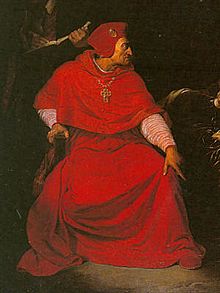Regency government, 1422–1437 facts for kids
The regency government of England from 1422 to 1437 was a special time when King Henry VI was too young to rule by himself. During this period, important decisions were made in the king's name by a group called the Regency Council. This council was made up of the most powerful and influential people in England.
The two most important figures in the Regency Council were the king's uncle, Humphrey, Duke of Gloucester, and Henry Beaufort, who was a powerful bishop and later a cardinal. Humphrey was the brother of Henry VI's father, King Henry V. Henry Beaufort was Humphrey's half-uncle.
Contents
Who Was on the Regency Council?
When the regency started on December 9, 1422, many important people were part of the council. They helped make decisions for the young king.
- John, Duke of Bedford
- Humphrey, Duke of Gloucester
- Thomas Beaufort, Duke of Exeter
- Henry Beaufort, Bishop of Winchester
- Henry Chichele, Archbishop of Canterbury
- John Kemp, Bishop of London
- Philip Morgan, Bishop of Worcester
- John Wakering, Bishop of Norwich
- Ralph Neville, 1st Earl of Westmorland
- Henry Percy, 2nd Earl of Northumberland
- John Mowbray, 2nd Duke of Norfolk
- Edmund Mortimer, 5th Earl of March
- Richard Beauchamp, 13th Earl of Warwick
- Henry FitzHugh, 3rd Baron FitzHugh
- Sir John Tiptoft
- Ralph Cromwell, 3rd Baron Cromwell
- Sir Walter Hungerford
- Sir Walter Beauchamp
Who Led the Regency?
The official leader of the regency was John, Duke of Bedford, who was Humphrey of Gloucester's older brother. However, John spent most of his time in France, managing the English lands there. Because of this, Humphrey, Duke of Gloucester, became the Lord Protector of England. This meant he was in charge of ruling England while his brother was away.
But Humphrey didn't rule alone. He had to share power with Cardinal Henry Beaufort. Beaufort held the important position of Lord Chancellor and led the Regency Council, which included many of England's powerful nobles.
What Challenges Did They Face?
The time of the regency was often filled with arguments and disagreements, especially between Humphrey of Gloucester and Cardinal Beaufort. Their disagreements sometimes led to tense situations, like the event known as the Parliament of Bats.
One of the biggest disagreements within the council was about the Hundred Years' War with France.
The War in France
Humphrey of Gloucester strongly believed that England should continue fighting the war in France until they won, no matter the cost. This war had been started by his brother, King Henry V.
However, things changed in France. A young French leader named Joan of Arc helped the French army become stronger. In 1429, the French prince, known as the Dauphin, was crowned as King Charles VII. It became clear that the French were starting to win and push the English out of their country.
Because of this, a group led by Cardinal Beaufort believed that the war was costing too much money and could not be won. They wanted to make peace with France.
Losing Allies
For most of the regency, the council managed to govern England well. But the disagreements became much clearer towards the end.
In 1432, Anne of Burgundy died. She was the younger sister of Philip the Good, the Duke of Burgundy. Anne had been married to John, Duke of Bedford. Their marriage was very important because it helped keep England and Burgundy as allies against France.
After Anne died, Bedford married someone else, Jacquetta of Luxembourg. The Duke of Burgundy didn't approve of this marriage, and as a result, Burgundy made peace with France. Losing Burgundy as an ally was a big blow for England.
With the loss of Burgundy, Bedford became convinced that making peace was the only way forward. A peace meeting was held in Arras in 1435, but the English representatives refused to give up their claim to the French throne.
John, Duke of Bedford, died shortly after this meeting. He was replaced by Richard, Duke of York, who did not support the idea of making peace.
Henry VI Takes Over
When King Henry VI finally became old enough to rule in 1437, he took control at a very difficult time. The disagreements about the war and the rivalries between the nobles were at their worst. England had also built up huge debts from the war. In France, English territories seemed to be slowly slipping away from their control due to a lack of strong leadership.
See also



